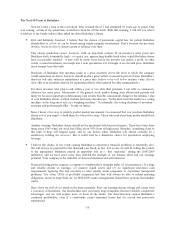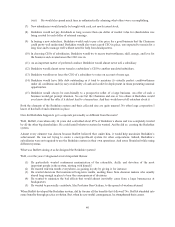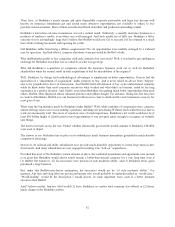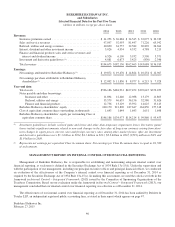Berkshire Hathaway 2014 Annual Report Download - page 38
Download and view the complete annual report
Please find page 38 of the 2014 Berkshire Hathaway annual report below. You can navigate through the pages in the report by either clicking on the pages listed below, or by using the keyword search tool below to find specific information within the annual report.‹The bad news is that Berkshire’s long-term gains – measured by percentages, not by dollars – cannot be
dramatic and will not come close to those achieved in the past 50 years. The numbers have become too big.
I think Berkshire will outperform the average American company, but our advantage, if any, won’t be
great.
Eventually – probably between ten and twenty years from now – Berkshire’s earnings and capital resources
will reach a level that will not allow management to intelligently reinvest all of the company’s earnings. At
that time our directors will need to determine whether the best method to distribute the excess earnings is
through dividends, share repurchases or both. If Berkshire shares are selling below intrinsic business value,
massive repurchases will almost certainly be the best choice. You can be comfortable that your directors
will make the right decision.
‹No company will be more shareholder-minded than Berkshire. For more than 30 years, we have annually
reaffirmed our Shareholder Principles (see page 117), always leading off with: “Although our form is
corporate, our attitude is partnership.” This covenant with you is etched in stone.
We have an extraordinarily knowledgeable and business-oriented board of directors ready to carry out that
promise of partnership. None took the job for the money: In an arrangement almost non-existent elsewhere,
our directors are paid only token fees. They receive their rewards instead through ownership of Berkshire
shares and the satisfaction that comes from being good stewards of an important enterprise.
The shares that they and their families own – which, in many cases, are worth very substantial sums – were
purchased in the market (rather than their materializing through options or grants). In addition, unlike
almost all other sizable public companies, we carry no directors and officers liability insurance. At
Berkshire, directors walk in your shoes.
To further ensure continuation of our culture, I have suggested that my son, Howard, succeed me as a non-
executive Chairman. My only reason for this wish is to make change easier if the wrong CEO should ever
be employed and there occurs a need for the Chairman to move forcefully. I can assure you that this
problem has a very low probability of arising at Berkshire – likely as low as at any public company. In my
service on the boards of nineteen public companies, however, I’ve seen how hard it is to replace a mediocre
CEO if that person is also Chairman. (The deed usually gets done, but almost always very late.)
If elected, Howard will receive no pay and will spend no time at the job other than that required of all
directors. He will simply be a safety valve to whom any director can go if he or she has concerns about the
CEO and wishes to learn if other directors are expressing doubts as well. Should multiple directors be
apprehensive, Howard’s chairmanship will allow the matter to be promptly and properly addressed.
‹Choosing the right CEO is all-important and is a subject that commands much time at Berkshire board
meetings. Managing Berkshire is primarily a job of capital allocation, coupled with the selection and
retention of outstanding managers to captain our operating subsidiaries. Obviously, the job also requires the
replacement of a subsidiary’s CEO when that is called for. These duties require Berkshire’s CEO to be a
rational, calm and decisive individual who has a broad understanding of business and good insights into
human behavior. It’s important as well that he knows his limits. (As Tom Watson, Sr. of IBM said, “I’m no
genius, but I’m smart in spots and I stay around those spots.”)
Character is crucial: A Berkshire CEO must be “all in” for the company, not for himself. (I’m using male
pronouns to avoid awkward wording, but gender should never decide who becomes CEO.) He can’t help
but earn money far in excess of any possible need for it. But it’s important that neither ego nor avarice
motivate him to reach for pay matching his most lavishly-compensated peers, even if his achievements far
exceed theirs. A CEO’s behavior has a huge impact on managers down the line: If it’s clear to them that
shareholders’ interests are paramount to him, they will, with few exceptions, also embrace that way of
thinking.
36
























